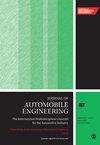基于学习的模型预测控制,实现安全路径规划和控制
IF 1.5
4区 工程技术
Q3 ENGINEERING, MECHANICAL
Proceedings of the Institution of Mechanical Engineers Part D-Journal of Automobile Engineering
Pub Date : 2024-08-02
DOI:10.1177/09544070241265763
引用次数: 0
摘要
模型预测控制(MPC)的控制性能在很大程度上取决于模型描述的准确性。为了更好地捕捉和预测受控设备的动态行为,本文提出了一种由高斯过程(GP)回归的非参数模型,用于评估标称模型与物理系统之间的未知偏差。首先,本文设计了一种高效的 MPC 公式,将标称模型与评估未建模动态的 GP 模型整合在一起,以实现安全稳健的机动规划。其次,为了提高优化效率,通过使用松弛的障碍函数来软化避免小车与障碍物碰撞的几何硬约束。设计了一种配置空间凸化算法,用于凸化路径预选中的走廊约束,并重新规划避障。演示了基于学习的 MPC 的控制性能,并在两个典型场景下与标准 MPC 策略进行了比较。数值模拟和实验结果表明,所提出的方法可以在避障过程中保持小我车辆的安全性、稳定性和可操作性。本文章由计算机程序翻译,如有差异,请以英文原文为准。
Learning-based model predictive control for safe path planning and control
The control performance of model predictive control (MPC) strongly depends on the accuracy of the model description. To better capture and predict the dynamic behaviors of the controlled plant, a non-parametric model which is regressed by the Gaussian Process (GP) is proposed in this paper to evaluate the unknown deviation between the nominal model and the physical system. Firstly, an efficient MPC formulation that integrates a nominal model with GP model which evaluates the unmodeled dynamics is designed for safe and robust maneuver planning. Secondly, the geometric hard constraints for collision avoidance between ego cars and obstacles are softened by using a relaxed barrier function for optimization efficiency. A configuration space convexification algorithm is designed for convexifying the corridor constraints in path pre-selection and re-planned for obstacle avoidance. The control performance of the learning-based MPC is demonstrated and compared with the standard MPC strategy under two typical scenarios. Numerical simulation as well as experiment results indicate that the proposed method could keep the safety, stability, and maneuverability of the ego vehicle during obstacle avoidance.
求助全文
通过发布文献求助,成功后即可免费获取论文全文。
去求助
来源期刊

CiteScore
4.40
自引率
17.60%
发文量
263
审稿时长
3.5 months
期刊介绍:
The Journal of Automobile Engineering is an established, high quality multi-disciplinary journal which publishes the very best peer-reviewed science and engineering in the field.
 求助内容:
求助内容: 应助结果提醒方式:
应助结果提醒方式:


